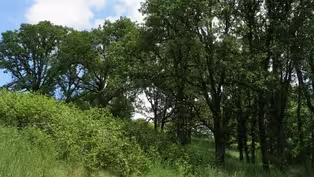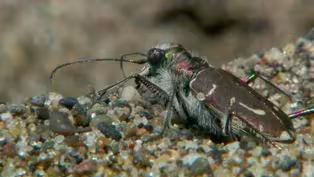Oregon Field Guide
Portland Rose Garden's summer blooms are the result of year-round work
Clip: Season 26 Episode 2612 | 8m 46sVideo has Closed Captions
Follow a year in the Portland Rose Garden with the man who has tended it for two decades.
Harry Landers worked for and curated Portland's famous International Rose Test Garden from 1989 to 2017. In that time, he increased the garden by more than 7,000 rose plants. His army of volunteers tend the 650 varieties across 4.5 acres of blooms. Portland Parks & Recreation gets hundreds of new roses free every year from rose companies in exchange for providing research and evaluation.
Problems playing video? | Closed Captioning Feedback
Problems playing video? | Closed Captioning Feedback
Oregon Field Guide is a local public television program presented by OPB
Oregon Field Guide
Portland Rose Garden's summer blooms are the result of year-round work
Clip: Season 26 Episode 2612 | 8m 46sVideo has Closed Captions
Harry Landers worked for and curated Portland's famous International Rose Test Garden from 1989 to 2017. In that time, he increased the garden by more than 7,000 rose plants. His army of volunteers tend the 650 varieties across 4.5 acres of blooms. Portland Parks & Recreation gets hundreds of new roses free every year from rose companies in exchange for providing research and evaluation.
Problems playing video? | Closed Captioning Feedback
How to Watch Oregon Field Guide
Oregon Field Guide is available to stream on pbs.org and the free PBS App, available on iPhone, Apple TV, Android TV, Android smartphones, Amazon Fire TV, Amazon Fire Tablet, Roku, Samsung Smart TV, and Vizio.
Providing Support for PBS.org
Learn Moreabout PBS online sponsorship(people laughing) - [Speaker] Look at him, he's just going and enjoying it.
- [Speaker] That is really pretty, isn't it?
It's just so beautiful, and the people you meet here, you know, every language comes through here.
(child crying) People asking to take your photographs, happy memories.
- They smell like apples.
Smell that one, it smells like apple.
- It does smell like an apple.
- If anybody comes to Oregon and misses this garden, they have missed Oregon.
You look at this and you can't help but have your heart fill up.
- [Speaker] It's very pretty.
- [Vince] Every year, Portland likes to put its best face on.
- Wow, this is really pretty.
We're forever trademarked as the City of Roses.
(birds chirping) - [Vince] It's early June, and every single rose plant in the Portland Rose Garden seems to have popped.
That's 10,192 bushes, by the way.
And there's one fellow who's been in charge of tending every last one of them for a quarter of a century, Harry Landers.
- 25 years, so I've seen the garden through a lot of things.
Just about every rose in this garden, I have planted.
- [Vince] He's quick to add, he's had a lot of help.
It's no accident that all these flowers bloom just in time for the annual Rose Festival.
To do it, the Portland Rose Garden begins its makeover six months early.
(tree scraping) - [Harry] Hi, Lori.
- Good morning.
(branches scratching) - [Vince] Harry's army of volunteers show up when the garden looks bleakest.
- He's just the most wonderful, fearless leader.
- This will get stripped.
- Love being in service to this guy.
- [Harry] 'Cause I'm saving those for me.
- [Kimberly] Harry cannot trim 4 1/2 acres by himself.
- [Vince] Kimberly Bowen came in late autumn to cut down roses.
This floribunda, named after Julia Child, is having her head chopped off.
- Julia and all roses are desperate for a little abuse every season because, to have flowers, you must prune.
(shears clipping) You really can't hurt 'em, they are almost a weed.
(groans) (leaves scratching) - [Vince] November's when they chop them back to save them from winter's winds.
- These big roses just fall over in the wind, so this keeps them from collapsing on us.
This is one time of year we can cut roses for ourselves.
(chuckles) The only time we allow roses to leave the garden.
(wind blowing) (bird cawing) - [Vince] A couple of months later, the garden faces a bitter challenge.
It's not snow that's the problem, it's a deep freeze.
Many of the roses can handle 20 degrees, but colder than that, and the garden has trouble.
(bird cawing) In the meantime, February arrives.
(shears clipping) - We're really in danger of losing a lot of tree roses this year because of our hard winter.
We had 12 degrees for four days here in the garden.
I am worried, I'm very concerned.
- [Vince] Harry won't know for a couple of months if it's as bad as he fears.
(shears clipping) The makeover army chops the canes even lower.
- And so when the volunteers start, they're almost afraid to make that first cut.
(shears clipping) Keep saying, "You can't kill it.
It'll grow back, you can't make a mistake."
(shears clipping) It's just really amazing how they grow back.
(people laughing) - [Vince] If this seems awfully early for pruning roses, Harry agrees, but he admits, he's in a hurry.
He needs to nudge these plants along to give them a headstart because, after all, the flowers have a schedule to keep.
They need to bloom in time for the Rose Festival, and that's the first week of June.
(machinery whirring) A couple of weeks later, they've got some holes to fill.
- This is February 18th, and it's about 45 degrees out and pouring rain.
(chuckles) (bag crackling) - [Vince] Every year, the garden gets new varieties of rose to try out.
- We don't pack the soil, we just get 'em in the ground and then we'll come back, water them in, and then level the beds, and we're done.
We don't do things by the book in the garden.
We do it efficiently.
- Fun part.
- [Harry] We're planting about 1,200 roses.
We just don't have time to do all the little mediocre steps.
(wheels grinding) - [Vince] But Harry takes one important precaution.
Every one of this year's 1,200 new rose bushes gets a bath first.
(water trickling) - This bucket of water costs about $600.
Out of the 1,200 roses we'll put in, we'll go through three buckets of this.
(metal clanking) So we really try to get our money's worth.
It better never spill.
(laughs) - [Vince] This is serious medicine.
- It is a live virus that helps protect the roses from crown gall.
- [Vince] Crown gall can infect roses right when they're planted.
- [Harry] It gets so big that it chokes the plant.
It looks like a big brain that grows on a rose.
- [Vince] Despite their best efforts, some bushes still get it.
Keep in mind, the reason they plant so many new varieties each year is because this is more than just a public park.
The official name is the Portland International Rose Test Garden.
- We evaluate them on disease resistance.
- Yeah, the foliage is pretty beat up.
- [Harry] How often they bloom, the shape of the bloom, the shape of the plant, just how healthy they are in general.
(birds chirping) - [Vince] Portland provides free research for rose companies.
- And in turn, they get free roses.
The idea of this garden is you can come here, you can see a rose, and go and purchase it somewhere.
- [Vince] It all started more than a century ago.
This whole mountainside slid in the 1890s, pretty much ruined plans for housing.
So, City Park was born, and in 1917, Jesse Curry contacted rose breeders in Europe.
He offered to save their specimens from the ravages of World War I.
(birds chirping) - He convinced them to send their roses here, and he would have them safe, and he would evaluate them then to let them know how good they did over here.
(bird cawing) - [Vince] An international garden was born.
- It's hard not to be enthused when you see all this beauty.
- [Vince] One rather well-known rose lover wrote, "A rose by any other name would smell as sweet."
Harry Landers has to take William Shakespeare's word for that.
- Yeah, I can't smell a thing.
- [Vince] You see, the man who has dedicated his life to caring for Portland's rose garden can barely smell a thing.
- I don't have a good sense of smell.
Try smelling, Vince, and see if you smell anything.
- [Vince] Yeah, sure.
Let's see.
Oh, that's beautiful.
- 'Cause I smell nothing.
(Vince and Harry chuckle) - [Vince] I'm so sorry.
- Me too, me too.
I really miss a lot.
(birds chirping) - [Vince] By early May, buds are slowly emerging, and the sad truth is unfolding about that hard freeze.
More than 50 roses in the garden have died.
- This one is actually dead, but it doesn't know it yet.
- [Vince] He can tell from the leaves, it's not going to survive.
The brown-colored pith inside its cane confirms it.
- It really hurts to see it happen, but you got to look at it positive.
I have room for another new batch of roses.
(chuckles) - [Vince] Harry says if you can get past bad weather, generally, roses shouldn't intimidate any gardener.
- [Harry] People make too much work out of them.
They're not that hard.
Roses are very easy to grow.
- [Vince] They can live and thrive year after blooming year.
The oldest one in this garden has blossomed for more than seven decades.
- [Harry] This rose was actually planted by the Grand Duchess Charlotte Armstrong in 1943.
People will often ask us, "How long will a rose live?"
So, here's this original plant.
- [Vince] Despite the free setback, spring weather, the roses, and Harry's guiding hand all conspired perfectly.
- Well, I'd like to welcome everybody here to the 19th Annual Portland's Best Rose Trials.
- [Vince] By Rose Festival, there doesn't seem to be an inch of the garden without color.
- [Speaker] This is probably the most stunning it's been this time of year.
- [Vince] The judges who choose Portland's Best Rose have a field day.
- The fragrance of these are just fantastic.
Wow, this is really pretty.
- Look at the veins on that.
- Today we're just judging of what looks pretty.
I love this rose.
- [Speaker] Look at that.
- And now, we are ready for Portland's Best Rose for 2014.
And the name of the rose is Sparkle and Shine.
(audience applauding) - [Speaker] Looks like a wedding bouquet.
- [Speaker] Oh yeah.
- [Vince] In his 25 years here, Harry has added nearly 7,000 more rose bushes.
He'd like to squeeze in 300 more.
(child exclaims) - What a marvelous thing we have here, but then you look at something like those, in all this, I mean, my gracious, how can it be more beautiful?
(bird cawing) (no audio)
Video has Closed Captions
Clip: S26 Ep2612 | 7m 38s | Visit a rare white oak savanna located on the south side of West Linn, Oregon. (7m 38s)
Video has Closed Captions
Clip: S26 Ep2612 | 8m 35s | What it takes to save the world's fastest beetle on the Oregon coast. (8m 35s)
Providing Support for PBS.org
Learn Moreabout PBS online sponsorshipSupport for PBS provided by:
Oregon Field Guide is a local public television program presented by OPB

















